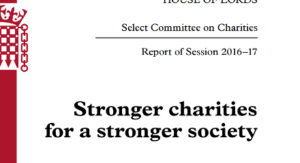Kirsty Weakley asks why the Sunday papers weren’t more interested in the big charity news this weekend.
When we were planning our coverage of the House of Lords Select Committee’s report last week my editor confidently instructed me to do a ‘what the papers said’ piece.
This seemed like a reasonable suggestion. The report was due to be published on Sunday and copies were issued to the press with a very strict embargo on the Friday – surely this meant there was going to be a big exclusive in a national?
Lots of people certainly thought so. There was obviously a downgrading of expectations following the tragic events in Westminster last week. But even so, it wasn’t a case of if the national media would cover the report, but how. What angle would they take? Would it make any of the front pages? Might there even be a mention of the coverage during the newspaper reviews on Sunday morning politics shows?
To be honest the timing was less than ideal for us in the trade press – we’ve been covering the committee closely for the last year, and yet when the big report is finally out the timing meant it came out on a day we would not usually be publishing news.
We needn’t have worried. Sunday morning came and there was nothing much to be concerned about.
Finally I found coverage in the Independent, Huffington Post, Belfast Telegraph, ITV news and the Shropshire Star, while the chair of the report appeared on BBC Radio 4 – though as yet no coverage on the website.
The report also got a mention in the Mail in a report about triggering Article 50.
Was the report just too sensible?
When committees of MPs have published critical reports about charities in recent years the nationals have been only too pleased to cover them in great detail.
So what was different here? Was it that the report was just too positive about the contribution charities already make to society? Charities themselves were delighted with the tone of the report.
There were many sensible recommendations around governance, funding, technology and improving the relationship between charities and government. But there were no dire warnings about the future.
The truth is that many of these things have been said before and they’re quite niche. If I wasn’t already aware of the debate within the sector around paying trustees, or whether the Charity Commission should charge for regulation, I’d struggle to understand why this was important.
But there’s a broader problem here – it highlights again how peripheral the serious charity policy issues are to the mainstream press. There’s widespread coverage of fundraising appeals or scandals – but little appetite to dig a little deeper.
It either has to be spectacularly bad or fantastically good to hit the nationals. The weekend’s coverage of JustGiving is an example of papers fixating on the negative angle.
What does this tell us?
Interestingly those that did cover the report led on the European Union angle. Like politicians, the media has become obsessed with all things Brexit.
There isn’t actually any new information here, the report refers to the projected £200m that the sector will lose out on as a result of Brexit, which has been reported by us before.
But evidently it was the first time that some journalists had thought about the impact of leaving the EU on the charity sector.
Ultimately the coverage, and lack of, demonstrates that the sector is still struggling to cut through and make itself relevant when there isn’t a crisis.
Some might say that after a couple of dreadful years in the press charities should be relieved that they’ve moved on.
In my view they should be more concerned. If the public only ever read about charities when something is going wrong, how can we expect them to understand and trust the sector?
Anyway, in case you missed it here is all of Civil Society's coverage.










